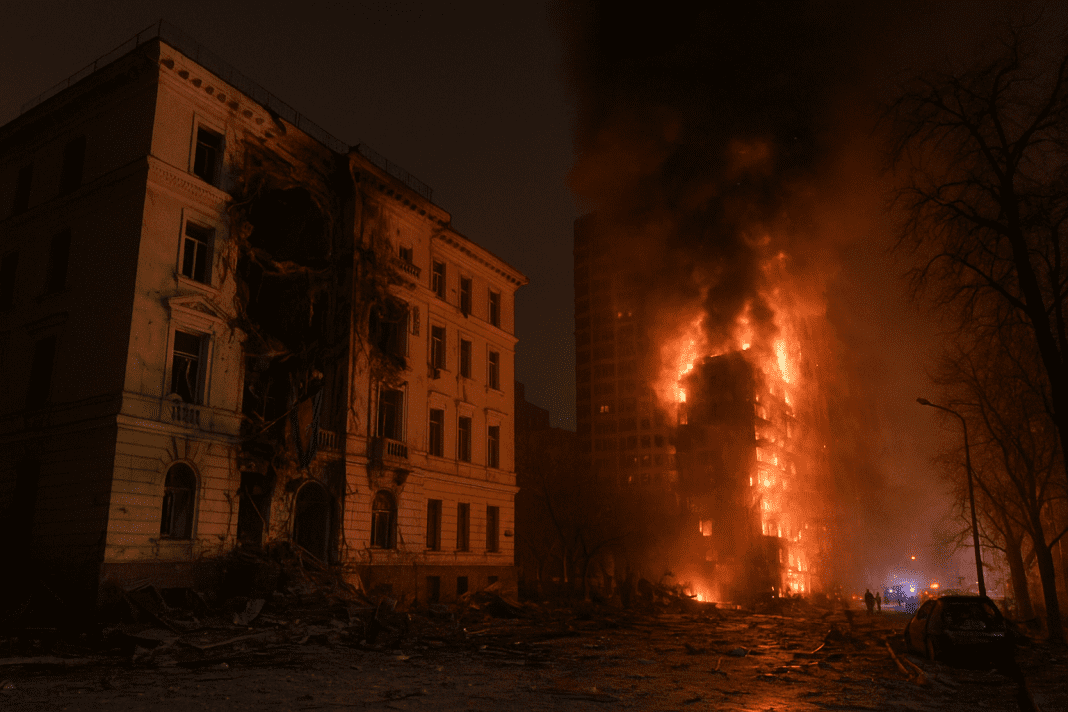A deadly overnight attack struck Kyiv in the early hours of November 14, causing widespread destruction across the capital, including damage to the Azerbaijani Embassy. The assault involved waves of drones, cruise missiles, and ballistic missiles launched while most residents were asleep. The attack was described by Ukrainian officials as one of the most intense strikes on the city in recent months.
Azerbaijani Embassy Damaged as Massive Nighttime Strike Hits Kyiv
During the assault, debris from a powerful ballistic missile fell on the Azerbaijani Embassy, leaving visible damage to the diplomatic building. Officials said the strike was part of a deliberate plan aimed at damaging civilian areas and critical infrastructure. The explosion caused part of the Azerbaijani Embassy’s exterior to crack and scattered debris across the surrounding street.
The nighttime attack hit both the right and left banks of Kyiv, igniting fires and destroying parts of high-rise buildings. Many residents woke up to loud blasts, smoke, and sudden darkness as the city’s power grid was severely affected.
Deadly strikes in Kyiv push NATO to unleash air-defense power in Baltic
Authorities confirmed that multiple types of weapons were used, including long-range cruise missiles, Iranian-made drones, and ballistic missiles. While Ukraine’s air defense systems intercepted several of them, many still reached residential zones, causing major destruction.
The president stated that the strike was clearly aimed at causing the highest possible damage to civilians. With the Azerbaijani Embassy hit during the attack, officials said the incident also violated international laws designed to protect diplomatic missions.
High-Rise Buildings, School, and Hospital Among Targets
The blast near the Azerbaijani Embassy was one of several destructive impacts across Kyiv during the overnight assault. The explosion damaged parts of the embassy building, though no staff were hurt. Emergency teams quickly secured the area to prevent further danger.
Across the city, drone strikes set multiple high-rise buildings on fire. One apartment tower was hit around the 15th floor, destroying several units, while another 22-story building caught fire near the 19th floor. Windows were blown out, balconies were torn apart, and many homes were heavily burned.
Fire crews rescued more than 40 people trapped in smoke-filled apartments. Some residents were guided down stairwells covered in debris, while others were helped through damaged hallways.
Across party lines: Americans unite to arm Ukraine and tighten sanctions on Russia
Authorities confirmed four deaths and 27 injuries. Many victims suffered burns, cuts from shattered glass, or breathing difficulties due to thick smoke.
The attack also damaged a school and a hospital, forcing staff to move children and patients to safer areas. Classrooms and hospital rooms were left covered in debris and exposed to the cold.
Several districts reported destroyed apartments, burned vehicles, and broken utility lines. Power outages and blocked roads disrupted public transport, leaving large parts of Kyiv without electricity, heating, or water for hours. Emergency crews worked through the morning to clear debris and begin restoring essential services.
Officials Condemn Civilian Toll After Azerbaijani Embassy Strike
Kyiv officials strongly condemned the attack, especially the strike on the Azerbaijani Embassy. Diplomatic missions are protected under international law, and hitting them is considered a serious violation. Authorities stated that the missile debris that hit the Azerbaijani Embassy showed how unpredictable and dangerous the attack had been, especially for areas housing international institutions.
Local leaders said the assault was clearly aimed at causing maximum harm to civilians. The combination of drones and missiles made the strike especially difficult to defend against. Even though many incoming weapons were intercepted, those that got through caused serious destruction across the capital.
The head of Kyiv’s military administration confirmed that rescue and repair operations were continuing around the clock. Engineers began working to restore electricity and water to areas affected by the explosions. Firefighters checked buildings for structural damage to ensure no further collapses would occur.
The State Emergency Service said it would keep assisting families who lost their homes during the assault. Many residents were provided with temporary shelter while emergency workers assessed which buildings were safe to return to.
Officials also mentioned an earlier investigation into a previous missile attack in another major city. Evidence recently collected linked certain commanders to that 2024 strike, showing a pattern of similar attacks targeting civilian areas.
Residents across Kyiv remain shaken after the latest assault, with the strike on the Azerbaijani Embassy standing out as one of the most alarming incidents of the night. The destruction left behind serves as another reminder of the ongoing dangers facing the capital and its people.

